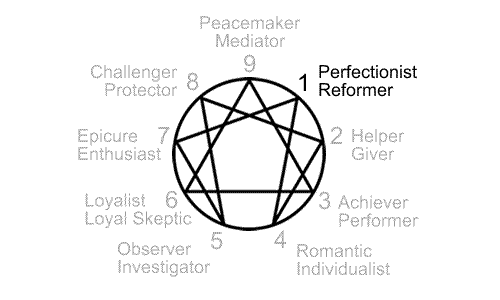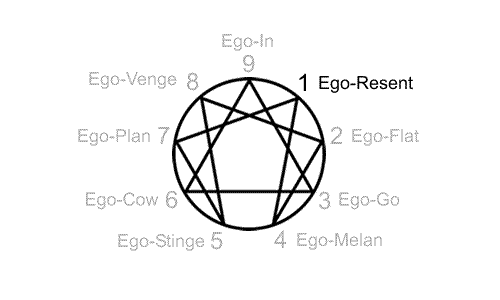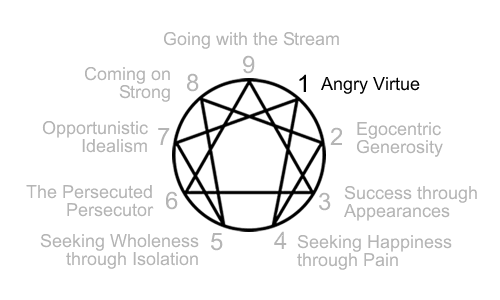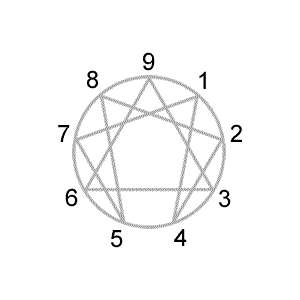Enneagram Type 1: Acceptability through Behavioral Correctness
The core focus of Enneagram type 1

Freedom consists not in doing what we like, but in having the right to do what we ought.
- Pope John Paul II
Early in life we develop an initial belief about ourselves and a compensation for that self-belief.
-
Type 1 Initial Self-Belief: “I am unacceptable as I am.”
Type 1 Compensation: "I must monitor, correct, and improve myself in order to be acceptable and remain above criticism."
Over time this gets generalized beyond the self into a core focus that also shapes how we perceive and interact with the world at large.
-
Type 1 Core Focus: Acceptability comes from doing things right and acting appropriately according to internalized standards for what that is. This requires I discern what’s right and monitor, correct, and improve my behavior so I don’t fall short of these standards. Others should do the same.
Personality characteristics that might arise from the type 1 core focus include:
- Monitors and corrects self-behavior by way of an Inner Critic
- Avoids making mistakes that can be criticized by others
- Compares the world to standards for how things should be
- Tends to look for one right way of doing things
- Strives toward an ideal of perfection
- Attention goes to what needs to be corrected or improved
- Critical of others when they disregard implied rules of behavior
- Tries to be good by modeling appropriate behavior
- Feels responsible for getting things right
Enneagram author descriptions of type 1

Below are Enneagram type 1 description samplings from some popular or well-known Enneagram authors. Click on the sources after the descriptions to further explore these interpretations.
-
The Reformer, The Rational, Idealistic Type: Principled, Purposeful, Self-Controlled, and Perfectionistic1
Basic Fear: Of being "bad," defective, evil, corrupt1
Basic Desire: To be good, virtuous, in balance--to have integrity1
-
How Ones Pay Attention: Perfectionism is supported by the habit of making mental comparisons. It is a way of paying attention in which thoughts and actions are automatically judged against an ideal standard of how perfect the situation could be.2
Basic Proposition: You must be good and right to be worthy.2
Strengths: Honest, responsible, conscientious, hard-working, dependable, practical, self-reliant2
Challenges: Resentful, rigid, judgmental, non-adaptable, overly critical2
-
Energy goes into: Getting things right. Issues about integrity. Maintaining standards judged to be important. Being responsible and self-reliant. Suppressing personal needs and natural desires.3
-
The Perfectionist: Ethical, dedicated and reliable, they are motivated by a desire to live the right way, improve the world, and avoid fault and blame.4
-
Perfectionists are realistic, conscientious, and principled. They strive to live up to their high ideals.5
-
Focus of Attention: Like the “superego” function of Freud’s model, Ones focus on noticing error (in the form of deviations from an internally generated ideal), discerning right and wrong, and displaying a reliance on rules and structure.6
Sources
1Book: The Wisdom of the Enneagram; Website: The Enneagram Institute
2Book: The Enneagram; Website: The Narrative Enneagram
3Book: The Essential Enneagram; Website: Dr. David Daniels
4Book: The Road Back to You
5Book: The Enneagram Made Easy
6Book: The Complete Enneagram; Website: Chestnut Paes Enneagram Academy
Type 1 Ego: Ego-Resent

The roots of the Enneagram types come from Oscar Ichazo's ego types. The ego types identified how a person was fixated in ego and the remedy for finding freedom from that.
Below are descriptions of Oscar Ichazo's ego type 1 fixation, trap, holy idea, passion, and virtue reinterpreted for today's Enneagram personality types.
Type 1 Fixation and Trap
Fixation: Resentment comes from trying to live up to standards for what's acceptable and right while others aren't.
Trap: Perfection comes from striving to attain or model an ideal that is free from flaws or criticism.
The fixation of resentment points to the mental preoccupation of the type 1 ego. The trap of perfection keeps an individual stuck in the fixation.
Type 1 Holy Idea
Holy Idea: Holy Perfection is about discovering the perfection of the world as it is instead of trying to impose your own set of standards upon it.
The fixation of resentment and trap of perfection keep an individual stuck in the type 1 fixation. The way out of that fixation is through holy perfection.
Type 1 Passion
Passion: Anger is an energy that corrects and improves what's unacceptable. "It's primarily directed at myself and secondarily at others and the world at large."
The passion of anger is the emotional energy that serves the fixation of resentment and trap of perfection.
Type 1 Virtue
Virtue: Serenity appears when you become more accepting of things as they are instead of demanding that they meet your standards for how things should be.
The virtue of serenity is what appears when the passion of anger subsides.
Personality traits of Enneagram type 1

A psychiatrist named Claudio Naranjo evolved Oscar Ichazo's ego-types into the Enneagram personality types as we use them today. Naranjo largely based the types on Ichazo's passions.
Naranjo outlined the following trait structure for type 1 (Ennea-type I) in his books Ennea-type Structures and Character and Neurosis.
- Angry Virtue - Anger and Perfectionism
- Anger
- Criticality
- Demandingness
- Dominance
- Perfectionism
- Over-Control
- Self-Criticism
- Discipline
Enneagram type 1 examples
While reading about the Enneagram types can be useful in understanding them, you eventually have to bring the types to life by seeing the many different ways they get expressed in life.
While the ideal is to be able to interact directly with people of each type, an alternative is to observe them from a distance. There are a number of ways to do this using videos. Many of these videos can be found on the Internet if you know what to look for (YouTube in particular).
- Type 1 Interviews and Self-Revelations
One method used to bring the types to life when teaching the Enneagram types involves interviewing people of a given type about how that type plays out in their life. This may be done through panels and one-on-one interviews.
Self-revelatory videos can also be useful where a person simply describes their type to a camera without the prompting of an interviewer.
Note that sometimes a person in a video may have been mistyped and may not offer an accurate representation of type when that happens.
- Type 1 Celebrities or Famous People
Once their Enneagram type is known, celebrities or famous people can also offer interesting examples of and insights into Enneagram type as revealed through interviews, lectures, writings, and the person's work.
However, it's not like the Enneagram panels, interviews, and self-revelations where people are specifically describing how they experience Enneagram type in their lives. It's more a matter of looking for glimpses into how Enneagram type is operating in the person.
It can be difficult to type someone at a distance. Look for a consensus of opinion on a person's type from multiple sources and hold it loosely. Celebrities and famous people are often typed differently by different Enneagram authors, teachers, and enthusiasts.
- Type 1 Fictional Characters
It needs to be made clear that fictional characters are not real people, even when they are based on real people. There can be a temptation to assign Enneagram type to every character in a story, but many characters don't have that kind of consistency or depth.
Not only might there be a number of different people, usually of different types, influencing the creation or portrayal of a character but often the character is nothing more than a vehicle for telling the story and moving it along.
While once in a while a character appears that you can attribute an Enneagram type to, generally it's more accurate to look at specific scenes as examples of a type rather than the character as a whole.
Tom Condon wrote a book called The Enneagram Movie & Video Guide that you may find useful for seeing type in fictional characters.
- Type 1 Songs and Lyrics
Although they do exist, there are few song lyrics that can be attributed to one particular Enneagram type. Most songs have both lyrical and musical elements that can be attributed to a number of different Enneagram types.
Songs are extremely subjective. There are many songs that listeners, and even performers, interpret in a very different way than the song writer intended. A number of songs also emphasize the sounds of words rather than their meaning.
As such, different people hearing the same song often will experience it as representing different Enneagram types.
Enneagram type 1 variations
There are a number of variations or flavors of type 1 that help explain why two people of the same type seem different. Click below for more info about variations of type 1.
Type 1 mistypes
Some people correctly identify their Enneagram type on their first try. For most other people determining type can take some time.
If you feel that you may have wrongly typed yourself as type 1 and have one or more alternative candidate types in mind then click on a link below to take a quick Enneagram test comparing type 1 to another type that may instead be your type.
Enneagram Tests to Help Determine Type

The Enneagram personality types consist of nine basic types. One of the types will be more dominant than the others. This dominant type is said to be "your Enneagram type".
Although there are nine basic Enneagram types, there are also many variations within each type as defined by such concepts as wings, centers, and instincts.
You can explore these variations using the type preference test below or one of the many other tests available on this website.
-
Enneagram Type Preference Test
This test produces a scored list of all nine types.
Questions are forced-choice, similar to the method used by the Riso-Hudson Enneagram Type Indictor (RHETI).
Use to determine type, wings, gut/heart/head types, and tri-center. -
Enneagram Type Comparison Test
This test compares any two types. The preferred type will have the higher score.
Use when you've narrowed your type down to two or three possibilities you'd like to compare.
Click here for the Complete Guide to the Enneagram.
This free guide explains- the nine Enneagram personality types
- the many type variations within type
- where the types came from (origins and history)
- how the types use the Enneagram symbol
Click here for Enneagram tests.
These free tests help you find your- primary type
- candidate types
- preferred wing
- intinctual subtype
- instinctual variant stacking
- center types (gut, heart, and head)
- tri-center with wings